Teacher shouting – Is it ever necessary to raise your voice in class?

Continual shouting at a child or a class can have long-lasting negative effects. But is it ever necessary to raise your voice in school?

- by Teachwire
- Classroom expertise and free resources for teachers

Are you a calm Miss Honey-type teacher or more of a shouting Trunchbull? As educators we spend nearly 190 days a year with our students which makes relating to them in ways that heal rather than harm extra important.
Join us as we explore the impact that shouting can have and practical strategies to help you manage your classroom without resorting to raising your voice…
What counts as shouting?
Sarah Watkins sets out how we can define shouting in a school context…
There are grey areas when it comes to teachers shouting in school. First, how exactly do you define shouting?
When I conducted a Twitter poll on the subject, one teacher commented: “I got dragged into the head’s office after a parent reported me for shouting at the class… I’ve honestly never shouted in my teaching career… I do raise my voice to make a point but in my view it’s not shouting.”
Half of the teachers who voted stated that a ‘short, sharp shout’ was essential at times. If Jenny is about to climb onto a wobbly stool to water the class cactus, then a short, sharp shout could prevent a trip to A&E.
“I do raise my voice to make a point but in my view it’s not shouting”
Interestingly, 8% of teachers felt that shouting is useful as part of a behaviour toolkit. Many were keen to stress that they remained in control. It was not shouting in anger, but rather a purposeful and calmly delivered discipline method.
My own behaviour management ethos is very much based around building and maintaining relationships with pupils.
Paul Dix, author of When the Adults Change, Everything Changes, comments: “Relationships are at the heart of great behaviour practice. They are so important as to leave everything in second place.”
Are teachers allowed to shout at students?
Teachers shouldn’t shout at students in a way that is abusive, threatening or intended to humiliate them. Raising your voice to gain attention or control a situation can sometimes happen, especially when managing classroom behaviour. However, it shouldn’t cross the line into shouting in an aggressive or harmful manner.
“It shouldn’t cross the line into shouting in an aggressive or harmful manner”
Schools typically have policies in place that promote a respectful and safe learning environment. Teachers should aim to use de-escalation techniques and maintain professionalism when dealing with challenging behaviour.
In cases where a teacher’s shouting is seen as inappropriate or harmful, it could lead to disciplinary action.
Should teachers shout?
Continual shouting at a child or a class can have long-lasting effects. “Shouting stops positive relationships forming and can make children anxious, waiting for the next outburst,” explains Beth Bennett, SENCo at Parklands Primary in Leeds.
“Shouting at individuals, especially those who are more vulnerable, humiliates them and brings out their flight or fight responses.
“It can even make pupils physically unwell. Shouting tells the children that the teacher is not in control of their emotions and pupils then just tune out or become louder to compensate.”
“Shouting tells the children that the teacher is not in control of their emotions”
Shouting in class can raise the stress levels of teachers as well as pupils. As professional voice users, we need to take care of our vocal chords unless we want to teach via sign language alone.
Shouting and ACEs
Neuroscience research over the last 20 years has shown that how we interact with children and teenagers can trigger bad or good behaviour. This is particularly true if the young person has a history of trauma or adverse childhood experiences (ACEs).
ACEs are stressful life events occurring in childhood, such as domestic violence, emotional neglect, parents separating, or living with a parent with mental health issues and/or an alcohol or drug problem.
If a student has experienced four or more ACES, they are 32 times more likely to exhibit challenging behaviour than a child who has not experienced any.
Harsh discipline, such as shouting, can re-traumatise students who are already traumatised, and lead to mental health issues later in life.
As humans, our physiological social engagement system impacts on how we respond to situations, especially when we are under stress or pressure.
“Harsh discipline, such as shouting, can re-traumatise students who are already traumatised”
Facial and vocal cues can trigger certain responses for teenagers, particularly those with a history of trauma. For example, a teacher smiling and using a warm, soothing tone of voice when speaking to a student will trigger natural opioids and oxytocin in the young person’s brain. These help to make them feel safe and calm.
Conversely, if a teacher has a stern, or even neutral expression, and shouts or speaks in a harsh tone, high levels of stress hormones trigger in the student’s brain. This instinctively takes them into a defensive mode of fear or anger – either flight, fight or freeze.
This tends to result in either challenging or withdrawn behaviour and shuts down the frontal lobes. These are key for learning and the ability to attend to what a teacher is saying.
How to stop shouting at your class
So what should you do if you find yourself stuck in a rut where you are regularly shouting at your class?
Behaviour specialist Sue Cowley (featured in the video above talking about shouting), says: “Try lowering your volume as a deliberate strategy – the quieter you are, the quieter your students have to be to hear you.
“Remember that non-verbal signals are often more powerful than verbal ones – signal displeasure without saying a word by using your ‘teacher stare’.”
“Try lowering your volume as a deliberate strategy”
No-shouting rule
If you decide to embed a no-shouting rule, this needs to be school-wide for it to be effective. Julie Rees, headteacher at Ledbury Primary in Herefordshire, employs such a rule.
She says: “It’s so clearly understood across the school now, we don’t even have to refer to it. Pupils are going to get angry but if we shout back, we’re simply reinforcing this behaviour.
“We are role models and we need to coach each pupil to learn from the situation so they can manage their emotions and move towards self-regulation.”
Consider creating a relationships policy
It is hugely beneficial to adopt a whole-school approach to behaviour management that incorporates relationship policies (for staff) as well as behaviour policies for pupils.
Such policies take into account the adult-child interactions that are likely to trigger challenging behaviour and those that heal students and result in good behaviour and improved social skills.
Relationship policies also consider the underlying causes of challenging behaviour, such as ACEs and mental ill health.
Through the provision of secure attachments with emotionally available adults, which come about through empathy, attunement and treating students with dignity – students can thrive in school.
Secure attachments to teachers have been associated with higher grades, greater emotional regulation, social competence, willingness to take on challenges and overall improved behaviour.
Try a restorative approach
Focus on teaching students social and emotional intelligence as well as cognitive intelligence. One great way to develop such skills is through the use of restorative conversations as a behaviour management tool.
This involves removing misbehaving students from the classroom. However, instead of placing them in isolation (no learning), a teacher trained in restorative practice will ask the young person a series of questions, such as:
- How are you feeling?
- What happened?
- What were you thinking at the time you misbehaved?
The teacher will also help the student to work towards a resolution. Often, through such curiosity, you’ll discover an underlying reason for the child’s behaviour.
They may have been bullied on the way to school or they may have heard their parents arguing the night before.
“Often, through such curiosity, you’ll discover an underlying reason for the child’s behaviour”
There is usually an untold narrative just waiting to be heard. Skills such as empathy and the ability to reflect well are essential in leading an effective restorative conversation with students.
A wealth of research indicates that restorative conversations lead to a reduction in bad behaviour, detentions and exclusions, as well as helping students develop social and emotional intelligence.
Harsh discipline results in anger or fear, whereas restorative conversation can lead to thoughtfulness and reflection on the part of the student.
Shouting teacher case study
Sarah Watkins explains how she helped a class teacher to stop shouting and get her teaching mojo back…
“EVERYONE LISTEN! STOP! PUT THAT DOWN!” The class teacher was becoming increasingly irate; the pupils were visibly fed up but not following any of her instructions. Enough to chill the blood of any teacher.
My role was to support this teacher. My coaching included helping her to see the impact of shouting: it wasn’t changing their behaviour and they had become oblivious to it.
One pupil said, “I just stop listening now because it’s too loud.” Recalling my own NQT year, I still feel shame about shouting back at a defiant pupil. I remember the look of resignation in his eyes.
He regularly faced anger at home. I’d just proved that I was another adult who shouted at him.
“I still feel shame about shouting back at a defiant pupil”
Powerful pauses
To save our voices and our sanity, silence is a much more effective strategy than shouting. After a few weeks with my mentee, she was using a powerful pause to great effect.
By sticking consistently to the school rules and sanction system, she could use non-verbal cues to refocus anyone who was distracted, without having to stop the learning.
Pairing this with relentless praise for what pupils were doing well, this teacher was quite clearly in charge. After a rocky start, and with a bit of welcome support, she had finally got her teaching mojo back.
Sarah Watkins has taught every year group and was previously head of school. She is an SLE (English) and currently teaches Reception.
Thank you to Dr Margot Sunderland for her help with this article. She is a child psychologist, psychotherapist, neuroscience expert and author. Margot is also the director of education and training at the Centre for Child Mental Health, a leading provider of mental health and trauma training in schools.










